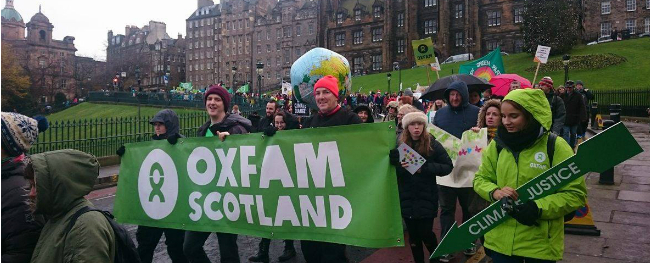As featured in the 29 December 2015 edition of The Scotsman
In the fight against poverty, turning points can be difficult to spot until years, even decades, later.
Despite levels of suffering few of us can fathom; there are good reasons to believe 2015 could be one of them.
In September, 193 countries adopted the UN Sustainable Development Goals (SDGs).
Having halved extreme poverty in just 15 years, the goals could help us end it for good in the next 15.
Achieving the 17 different pledges by 2030 would see the world end hunger and provide health and education for all.
However, the SDGs will only be delivered if they spark new and better decisions at national level.
Their success also rests on narrowing the gap between the richest and the poorest.
The combined wealth of the richest 1% of people in the world has now overtaken that of the other 99%; this threshold was breached a year earlier than Oxfam predicted. While inequality between countries has reduced in recent decades, within countries it has grown to worrying levels – and it is getting worse.
It can be easy – and comforting – to see inequality simply as a global issue.
But we estimate the 14 richest families in Scotland are wealthier than the poorest 30% of the population combined.
This massive disparity cannot be the price for our country’s collective wealth.
Not when one in five people in Scotland live in poverty, with increasing numbers forced to turn to emergency food support, and an unknown number of others suffering hunger without seeking help.
However, again, 2015 could provide a springboard for progress.
The First Minister has committed to delivering the SDGs, and her Scottish Government’s revised economic strategy now has reducing inequality at its heart.
These moves were further supported by initiatives like the Fairer Scotland discussion and the appointment of the first independent adviser on poverty and inequality.
The Scottish elections in May create a significant opportunity to realise the increasingly shared cross-party support for a more equal Scotland.
In doing so, we must build on another achievement of 2015 – the UN climate deal reached in Paris.
We know from our global work that climate change undermines development, making the lives of some of the poorest and most vulnerable people, particularly women, even harder.
Oxfam worked hard as part of a global movement to put pressure on leaders in Paris and we were proud to march alongside thousands of others at Scotland’s Climate March.
The frayed lifeline the deal has thrown to the entire world, but particularly those battling climate change right now, will need to be strengthened.
The First Minister’s pledge to increase our Climate Justice Fund is a timely boost, but funding must continue to rise to meet growing need. All parties must also fulfil Scotland’s emission reduction promises.
Yet alongside hard-won global political progress, 2015 will be defined – perhaps above all else – by a single, gut-wrenching, image: three-year-old Aylun Kurdi lying lifeless on the shore of a beach in Turkey.
It spoke to the appalling ordeals faced by millions dealing with chaos, death, and destruction as a result of conflict, natural disasters and the impacts of extreme climate events.
Record numbers of people – like Aylun – have fled their homes for safety, or died trying.
The cross-party support for refugees in Scotland is something we can all be proud of.
Oxfam is responding within Syria and surrounding nations, but also in South Sudan, the Central African Republic, the Philippines, Gaza, and many others countries – including the forgotten crisis in Yemen.
We can only do so because of the ongoing generosity of the public.
In 2015, people in Scotland once again responded – for example, by donating £4 million to the Disasters Emergency Committee Nepal Earthquake Appeal, including £250,000 from the Scottish Government.
In May, the governments of the world will again converge – this time for the first World Humanitarian Summit. It cannot change everything, but for the tens of millions of women, men and children who receive humanitarian aid every year – and the millions more left without help – the stakes are incredibly high.
Scotland’s moral obligation aside, the refugee flows to Europe, and the Ebola outbreak in West Africa, taught us that Scotland cannot presume that global problems won’t affect us.
We must learn from 2015 by planning ahead. A small but responsive International Emergency Fund would bring greater predictability to our welcome but ad hoc emergency funding. We must also restore and protect the value of Scotland’s International Development Fund – devalued by a six-year funding freeze.
Ultimately, whether or not we will look back at 2015 as a turning point in the fight against poverty will not be dictated by global deals, however welcome they may prove to be.
It will be determined by the actions of individual governments, supported and challenged by motivated and passionate citizens – like those in Scotland.
